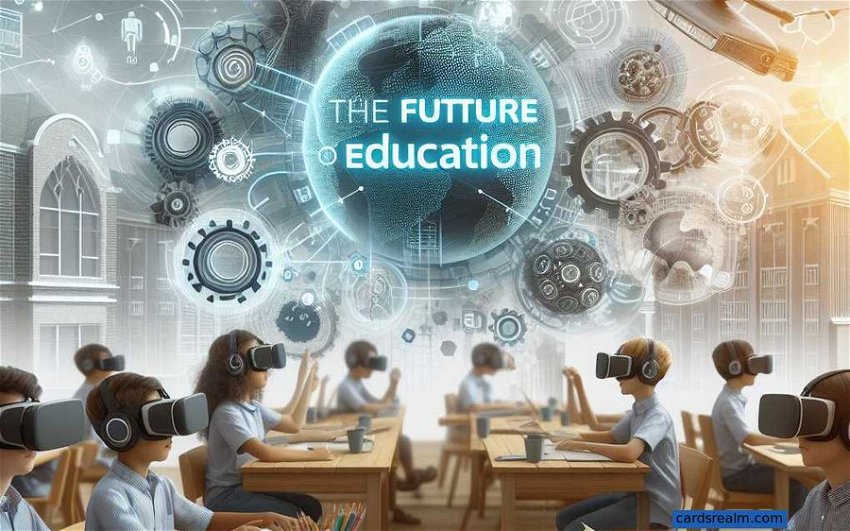The educational landscape is undergoing a significant transformation, propelled by technological advancements and the shifting needs of society.
As we look towards the future, several trends and innovations are emerging as central to shaping the learning experience.
These developments promise to make education more accessible, engaging, and effective for students worldwide.
Embracing Technology and Digital Innovation
Immersive Learning
One of the most exciting advancements in education is the rise of immersive learning experiences.
Ad
Technologies with Justmarkets, such as virtual reality (VR) and augmented reality (AR) are making it possible for students to explore complex subjects in a highly interactive and engaging manner.
Immersive learning enables students to experience historical events, scientific phenomena, and mathematical concepts in a vivid and tangible way, leading to improved understanding and retention of information.
Artificial Intelligence (AI) in Education
AI is set to revolutionize the educational sector by providing personalized learning experiences. AI-driven platforms can adapt to the learning pace and style of each student, offering customized content and recommendations.
This ensures that learners receive the support they need to master subjects effectively.
Moreover, AI can assist educators in grading and assessing student performance, allowing them to focus more on teaching and less on administrative tasks.
E-Learning and Remote Education
The COVID-19 pandemic accelerated the adoption of e-learning solutions, highlighting the importance of remote education.
E-learning platforms provide students with the flexibility to learn at their own pace and access a wide range of resources from anywhere in the world.
As technology continues to improve, we can expect e-learning to become even more immersive, interactive, and effective.
Fostering Inclusion and Accessibility
Inclusivity in Education
A key trend shaping the future of education is the emphasis on inclusivity.
Educational institutions and technology providers are working to ensure that learning materials and platforms are accessible to students with diverse needs, backgrounds, and learning abilities.
This includes the development of content that is culturally sensitive and reflective of a global perspective, as well as tools that cater to learners with disabilities.
Bridging the Digital Divide
Despite digital innovation's benefits, ensuring equitable access to technology remains a significant challenge.
Efforts are being made to bridge the digital divide by providing affordable devices and internet access to underprivileged communities.
Additionally, innovative solutions such as SMS-based learning and low-bandwidth platforms are being developed to reach students in remote areas.
Enhancing Learning through Engagement and Interaction
Gamified Learning
Gamification is another trend gaining traction in the educational sphere. By incorporating game elements into learning activities, educators can motivate students and make the learning process more enjoyable.
Gamified learning not only boosts engagement but also encourages competition and collaboration among students, enhancing their problem-solving and teamwork skills.
Peer Learning and Mentorship
The role of peer learning and mentorship is becoming increasingly recognized as vital to student success.
Near-peer mentorship, where students are guided by slightly older or more experienced peers, has shown promise in improving academic outcomes and fostering a supportive learning environment.
Ad
This approach leverages the credibility and relatability of peer mentors, making it easier for students to connect and engage with the learning material.
Preparing for the Future Workforce
Career Integration and Skills Development
As the job market evolves, education is adapting to prepare students for the future workforce.
There is a growing focus on integrating career services and experiential learning opportunities within educational programs.
This ensures that students not only acquire academic knowledge but also develop the practical skills and networking connections necessary for their future careers.
Emphasis on Soft Skills
In addition to technical skills, soft skills such as emotional intelligence, communication, and problem-solving are also highlighted in educational curricula.
These skills are critical for success in a rapidly changing job market and are being fostered through innovative teaching methods and extracurricular activities.
Conclusion
The future of education is bright, with trends and innovations focusing on making learning more personalized, accessible, and aligned with the needs of the future workforce.
As we continue to embrace technology, foster inclusivity, and enhance engagement, we can look forward to an educational landscape that not only imparts knowledge but also prepares students for a successful and fulfilling life.
Meta Title: Exploring the Future of Education: Key Trends and Innovations
Meta Description: Dive into the transformative trends and innovations shaping the future of education. Discover how technology is making learning more accessible.





— Comments0
Be the first to comment